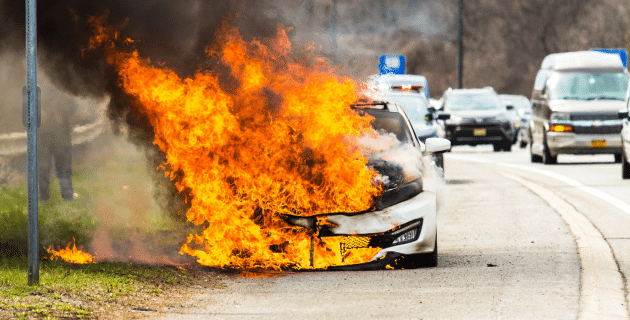Are you more likely to encounter a vehicle fire in an electric vehicle or a gas-powered one? The answer may surprise you. We’re breaking down the risks of each, and sharing important tips to help keep you safe from a car fire no matter which type of vehicle you drive.
Fires happen in all types of vehicles.
Despite articles circulating on the Internet, there is no government agency tracking fires by the type of vehicle. So, we don’t have a clear idea of which type of vehicle is more prone to fires: gas, electric or hybrid. You’re more likely to see a fire in a gasoline-powered engine than an EV or hybrid, simply because there are more of those vehicles on the road.
We do know that less than half of one percent (or 0.04) vehicles catch fire in any given year. Even though that seems like a low percentage, consider that there were more than 200,000 vehicle fires in the U.S. in 2018, as reported by the National Fire Protection Association (NFPA).
What causes vehicle fires?
Engines produce heat, and when heat connects with a spark or a flammable liquid, a fire can start. Here’s a quick overview of how fires typically happen in gas versus electric vehicles.
Gas-powered combustion vehicles
- Fuel system leaks are the most common causes of fires in gas-powered vehicles. Gasoline is highly flammable and can catch fire from a single spark. Gasoline at a high enough temperature can ignite by itself.
- Electrical system failures are the second most common cause of gas-powered car fires. The electric current produced by a standard lead-acid battery, along with faulty or loose wiring, can produce sparks. Those sparks can ignite a fluid leak or hydrogen gas buildup.
- Flammable fluids can cause fires if their lines, hoses, or containers are damaged. These fluids circulate through your gas-powered engine, and include oil, transmission fluid, power steering fluid, brake fluid, engine coolant and gasoline or diesel. An overheated engine can sometimes cause these fluids to seep out of their designated areas. The anti-lock brake system also can leak brake fluid that can cause an electric short, which can lead to a fire.
- Exhaust-related fires can come from catalytic converters. These parts can be so hot that they can ignite grass under your vehicle. Catalytic converter fires usually occur if your car’s engine doesn’t burn fuel properly, and extra stuff winds up in the exhaust. That causes your catalytic converter to work too hard to burn off those extra pollutants.
- Crashes can cause fires, even though most vehicles are designed with crumple zones that protect the engine, battery, and gas tank. Even so, a crash can cause fluid to leak, and create heat and smoke, which are the ideal conditions for a fire.
Electric vehicles
- Batteries can cause fires in electric and hybrid vehicles. This can happen if the battery is overcharged, damaged, or has a faulty design. The battery is short-circuited, causing a chemical reaction that results in flammable, poisonous gases. This can even happen when a car is not being driven.
- Crashes can damage the battery. If the coolant surrounding the battery leaks out, it can quickly heat up and cause a fire. A crash can also compromise the battery so that it short circuits and heats up. Manufacturers have included safety features such as automatic shutoffs for batteries during a crash, and coatings that help fire from spreading.
EV Car Fires: Much Tougher to Control
Lithium-ion batteries provide their own fuel source, and as a result, can burn for hours on end. They are sometimes hotter than gasoline-powered fires, and therefore harder to cool down. If you call 9-1-1 for a car fire involving an electric or hybrid vehicle, make sure you mention that fact. There are specialized fire extinguishers and firefighting techniques for electrical fires.
Signs Your Car May be in Danger of Catching Fire
Older vehicles may have wiring or other issues that can lead to a fire. However, any car could be at risk. If your vehicle exhibits any of the following signs, take it to your mechanic immediately.
- Quick drops in fuel levels or oil levels
- Wide ranges and changes in your engine’s temperature
- Fuses that repeatedly that pop
- A smoky or burning smell
- Smoke or sparks
- Fluid leaking under your car
What to Do if Your Car Catches Fire
Here’s what to do if your car catches fire.
- Pull over safely as soon as you can.
- Turn the engine off.
- Get everyone out of the car and at least 100 feet away.
- Call 9-1-1.
- Don’t go back into the vehicle for any reason.
- Don’t open the hood. A burning car can explode at any moment.
Your car is one of your greatest investments. Keep your car well maintained and protect it with the right insurance. Safe travels.
This article is furnished by California Casualty, providing auto and home insurance to educators, law enforcement officers, firefighters, and nurses. Get a quote at 1.866.704.8614 or www.calcas.com.
- California Casualty Earns Financial Stability Rating® of A, Exceptional, From Demotech, Inc. - April 28, 2025
- Music & Arts Grant Recipients – 2024 - December 13, 2024
- Understanding Auto and Home Insurance Rate Changes - December 3, 2024

